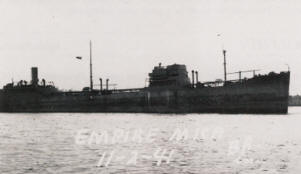The Empire Mica Wreck
The Empire Mica Wreck
Panama City Beach,
Florida
History of the Empire Mica
The British standard type Ocean tanker Empire Mica was built
in 1941 for the Ministry of War Transport at Haverton Hill, Teeside, by Furness
S.B. Co. of Haverton Hill on Tees. She
was 479 feet long, had a 61 foot beam, displaced 8,032 gross tons and was
powered by 674 nhp triple expansion engines. She was managed by Anglo-American Oil Co. Ltd.
of London.
On June 29, 1942, while en route from Houston and New Orleans to the United Kingdom with a cargo of 12,000 tons of clean oil, she was torpedoed by the German submarine U-67 and sunk off the west coast of Florida. The next day one lifeboat with 14 men aboard was rescued by the vessel Sea Dream. A total of 33 crewmen were lost.
On June 29, 1942, while en route from Houston and New Orleans to the United Kingdom with a cargo of 12,000 tons of clean oil, she was torpedoed by the German submarine U-67 and sunk off the west coast of Florida. The next day one lifeboat with 14 men aboard was rescued by the vessel Sea Dream. A total of 33 crewmen were lost.
Today the remains of the Empire Mica lie 64 miles from
Panama City and 20 miles south of Cape San Blas in 115 feet of water. Her bow section is intact, and divers will
recognize her two boilers, propeller shaft, and rudder. Her propeller was salvaged by Captain Laney
Rinehart, who purchased the salvage rights to the vessel from the War Insurance
Department for 600 pounds sterling, about $1,000.
Laney's recovery story is testament to his own persistence. He started in 1981, and with the help of Jack
Pounders, planned to blow the prop off the shaft. After two explosions, the nut was off, but the
huge propeller remained on the shaft. In
June, Laney and his crew went back to the wreck, and after two more explosions,
the prop was left lying in the sand. Laney
returned to the wreck once again with two 20,000 pound lift bags. His plan was to lift the propeller, then tow
it back to port. After one bag was
rigged, they found the second lift bag had been sabotaged. Once again Laney returned to port without the
propeller. Laney and Jack Pounders hired a 300 foot barge with a 190 ton crane
and brought it to the site. They dove
and discovered that someone else had stolen the propeller. Laney immediately contacted the U.S. Marshall,
and they had the propeller located and impounded. Six months later, a federal judge ruled in
Laney's favor. The huge propeller is now
decorating the Captain Anderson restaurant in Panama City.
Johnny, his dad, and I ventured out to Empire Mica. Even
though the Gulf was a giant, glassy pond, visibility wasn’t that great. The whims of the currents will often give one
100 feet visibility one day and 30 feet the next. As we swam down to the wreck, clouds of
minnows obscured much of the wreck making any attempt at photography a trying
experience. Our make shift camera
housing leaked at about 50 to 75 feet so no photos were salvaged.
We explored the bow and bridge section where the first
torpedo struck. You must understand that
the ship resembles very little of its former self. Even still it was massive having never seen
anything like it in our diving experience.
The bow is still intact but has broken away and tilts to starboard. The rounded stern with its massive propeller
shaft protruding towards the open sea also lies broken and tilted, an eerie look
for its final resting place.
After WWII the Coast Guard blew up the stern and bridge of
the ship, as they were so near the surface and created a hazard to navigation. Rust and hurricanes managed to reduce what was
left to a jumbled pile of iron and steel. Only one small section between the bridge and
the engine room still stood when we were there. We swam through it on our
exploration of the wreck. This large
room, cavernous and eerily serene with sunlight filtering in through breaks in
the hull, once held millions of gallons of gasoline.
Hundreds of snapper and grouper darted in and out of the
thousands of hiding places along the ship. The big fish know the sight and sound of
divers and the spear guns they carry. They
have witnessed the sight of their schoolmates on the end of a spear and want no
part of it.
We saw a deadly Bull Shark (No. 1 man-eater of the shark
family) cruising about. If there were
more, the water was so planktonic that we couldn’t see any more of them. Only the steely barracudas approached us,
teeth always bared, looking for a speared fish to steal if the opportunity
arrived.
As we ascended, the wreck slowly receded into the depths, an
oasis of abundant life in this sandy desert of the Gulf, and a ghostly metal
tombstone to the 33 men and boys who lost their lives here many years ago.
Ice


Comments